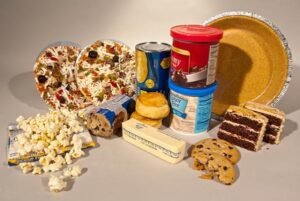In order for our diet to be completely healthy and balanced, we must include the consumption of fatty foods in our daily meals. But for this, we have to know how to distinguish which fats are good, that is, necessary for the body, and which represent a danger to our health. In this case, those that we should avoid or limit their consumption at all costs, are those that we know by the name of hydrogenated fats.

These types of organic substances are not exactly good for health, especially if we consume them in excess. For this reason, in this article we show you a list of foods with hydrogenated fats so that you can limit their consumption and, consequently, lead a healthier life.
What are hydrogenated fats and what type of fats are there
Hydrogenated fats are a type of industrial fatty acid that is achieved through a process called hydrogenation, in which vegetable oil in a liquid state is transformed into solid fats thanks to the aggregation of hydrogens. In other words, the state of vegetable oil is modified, transforming part of its polyunsaturated fats into saturated fats. That is why these fats are also popularly called trans fats.
In this way, this compound is obtained, which has the following utilities:
- Its composition means that food is kept in good condition for a longer time.
- It improves both the taste and the texture of many food products.
- The hydrogenation process with which this oil is obtained turns out to be very economical.
For these reasons, many manufacturers dedicated to the food sector choose to use this type of solid oil in their food range.
Types of fats in food
In addition to this fatty compound, we also find other types of fats in food products that their consumption may or may not be beneficial for our health:
- Unsaturated fats: this type of fatty acids are considered “good fats” because they are necessary for the proper functioning of our body, as long as we consume them in moderation. We can find them in foods such as nuts, avocados, olive oil and salmon, among others.
- Saturated fats: these are considered “bad fats“, especially if consumed in excess, since they can bring health problems such as increased bad cholesterol, obesity and / or hypertension, among others. These types of fatty acids are found mainly in processed food products.
Negative effects of hydrogenated fats on our health
This type of fatty acids that we find in many foods are considered of little benefit, especially if consumed in excess, due to the following negative effects on our health:
- They considerably increase the levels of bad cholesterol and triglycerides in the blood.
- Its regular consumption notably lowers the levels of good cholesterol or HDL in the blood.
- They increase the risk of cardiovascular disease.
- They also increase blood glucose levels and, consequently, suffer from type II diabetes.
- If you take excessive food with this substance while you are pregnant, you will increase the probability of delaying the growth and brain development of the future baby.
- Finally, some studies affirm that people who consume hydrogenated fats daily have a higher risk of mental disorders such as depression.
List of foods rich in hydrogenated fats
If you want to know which foods are rich in this industrial substance, you only have to look at the labeling where the product has been packaged. The list of ingredients should indicate that the food contains hydrogenated or trans fats, although sometimes it is also indicated as containing “partially hydrogenated” fats. At other times, the label may be disguised under the name of “vegetable fats “, although they could also refer to other types of saturated fats such as palm or coconut.
Even so, here is a list of foods that are rich in this type of fat:
- Industrial pastries (muffins, donuts, croissants, buns, etc.).
- Other sweets like cookies and cereal bars.
- Prepared sauces and envelope soups (those that you can find dehydrated in the supermarket).
- Popcorn: especially those that are already ready to microwave.
- Ice creams and margarines.
- Frozen like pizzas, croquettes and nuggets, among others.
- Snacksand snacks such as bag potato chips.
- Pre-cooked dishes like cannelloni, dumplings, pasta and lasagna.
- Any product considered “fast food” such as hamburgers, fries, etc.








